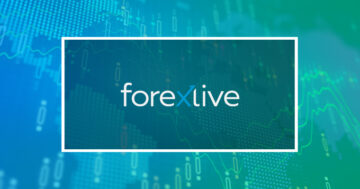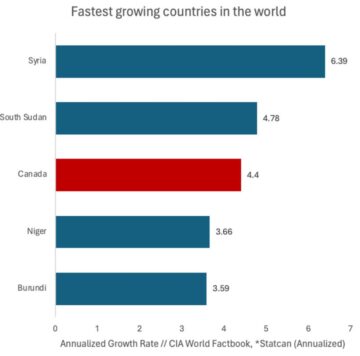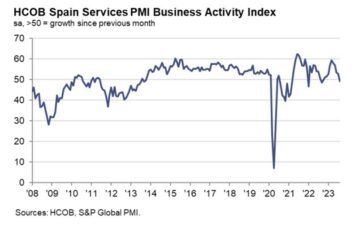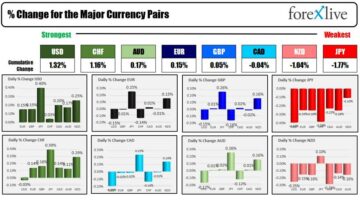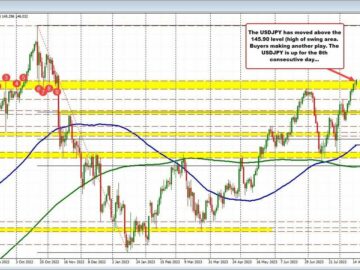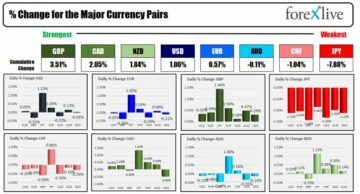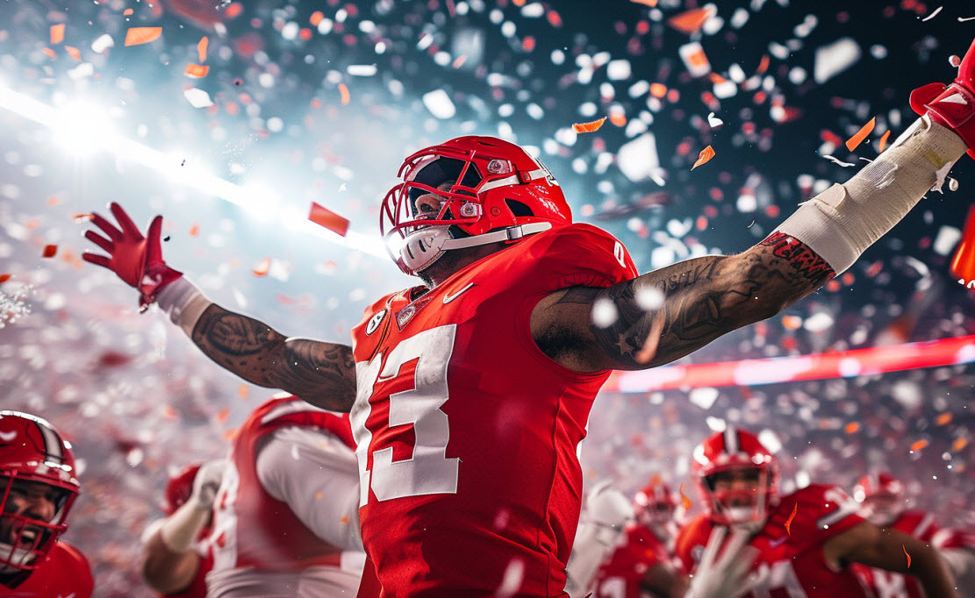
Sunday features the quintessential American cultural event — the Super Bowl.
The game itself and its importance in American culture hint at what makes America what it is, and why US stock markets are at record highs as the rest of the world falls further behind.
The fairy-tale version of United States excellence leans on high-minded ideas — freedom, democracy, capitalism, a rules-based economic order, a magical scroll from the Founding Fathers.
That’s all bullshit.
Modern America stands for one thing and operates on one single principle: Win.
This Sunday is Super Bowl 58 (or LVIII in a nod to Rome). I’d argue that all the past 58 years of American economic dominance comes down to a creeping, evolving and now dominant philosophy built on winning as the singular guiding light in nearly all aspects of life.
What makes America unique in the empires of history is the slight tweak in philosophy. Past empires aimed to dominate and control; American just wants to win. Now sometimes that requires tapping into the $886 billion defense budget for some old fashioned dominance and control but the wisdom of America is that it realizes this is an expensive game that has been the downfall of many empires.
To use a schoolyard analogy, America doesn’t want to beat everyone else so badly that they quit, start their own game, or collectively turn against the US. America wants to keep everyone playing the game but always making sure it has a comfortable lead. There has to be an illusion of a reasonably fair playing field or it all falls apart.
Perhaps the real genius of the US has been in convincing the world that it is a fair game. Or that all of those old-fashioned high-minded ideas are what guides American government and business when it’s one simple thing: Win at all costs.
Seeing as football is on the agenda this weekend, here’s a quiz: What do the greatest football coach of all time and this year’s college football national champions have in common?
The answer: They cheated.
Both were caught red-handed cheating to win. As were the Houston Astros and, just Friday the New York Mets (Yes those are the same Mets owned by hedge fund billionaire Stevie Cohen who was caught insider trading).
What else do all these examples have in common? They effectively got away with it.
In a culture of winning, all that matters at the end of the day is wins. If you ask them, they’d probably tell you they only cheated more effectively than the others.
Now in sports it’s disgraceful, I don’t want my kids looking up to cheaters, but business is business. It’s ruthless.
The two quintessential businessmen of the last 40 years — Bill Gates and Steve Jobs — both admittedly stole their best early ideas from Xerox PARC.
Jobs first debuted the graphical interface and then Gates quickly copied it, leading to this famous exchange.
“You’re ripping us off!”, Steve shouted, raising his voice even higher. “I trusted you, and now you’re stealing from us!”
But Bill Gates just stood there coolly, looking Steve directly in the eye, before starting to speak in his squeaky voice. “Well, Steve, I think there’s more than one way of looking at it. I think it’s more like we both had this rich neighbor named Xerox and I broke into his house to steal the TV set and found out that you had already stolen it.”
Meanwhile, the current world’s richest man — Elon Musk — has a long history of bending the law. It’s not particularly notable that top businessmen look for an edge anywhere, what’s notable is how the US tolerates it so long as you’re a winner.
Cheating is ok, so long as you win; so long as you’re sending up spaceships, redefining the automobile industry, or popularizing computers. And who could argue against it? The benefits of what those men have done for civilization far outweigh whatever ethical, and even legal, transgressions that might have been involved.
By the same token, the US winning doesn’t mean everyone else loses; just the opposite. A richer planet is a place where American companies have more consumers to sell to. The beauty of the system is that it grows the global economic pie and ultimately delivers incredible innovations globally. Hardly a person alive hasn’t benefited greatly from the American system, it’s a marvel.
Still, the American-style capitalism part of that bargain though only works perfectly fine on one condition: American companies win. Just like back in the school-yard, America will change the rules of the game until it wins. It will cheat on treaties, subsidies, litigate, persecute, lie and cheat to keep its companies on top, or at least in the game.
I have no doubt that a large part of the American spying apparatus is dedicated to industrial espionage and passing those secrets to US companies (and protecting those companies from other countries trying to do the same) — the ROI on those operations is undoubtedly spectacular for taxpayers. It’s hardly a conspiracy, as it’s precisely what Edward Snowden revealed.
Huawei may or may not have been spying on you but there is compelling evidence that the dramatic steps to get them out of the western world was an orchestrated campaign more about economic security than military security.
The same treatment is coming for TikTok and BYD. Foreign companies Nokia, Nortel, Siemens, Blackberry and Alstrom were all well-documented victims of industrial espionage, some by the US, some by others, some unknown. Yet I find it awfully coincidental that American companies came out ahead. But state-sponsored winning is still winning.
That’s not to say that China isn’t stealing everything it can get its hands on. It is. They understand that game.
But American is three steps ahead. They see how the game is also changing before anyone even realizes it’s being played. The US isn’t trying to limit Chinese access to Nvidia chips only because China will use them in military hardware. It’s trying to limit access to invention. The era of people investing things is dead. Every breakthough in the future will come from AI and that means that whoever has the best chips owns the future.
I worry about the side effects of a win at all costs culture.
The clannish dedication to football-style winning has devolved into politics and — worse yet — voting. People increasingly support their team no matter what.
I’d argue that the entire political story of this century is explained by Republicans briefly believing their own free-market ethos for a few weeks in 2008. That resulted in the worst American economic calamity in generations and led to the rise of the Tea Party, which started as a fiscal protest group then morphed into a protectionist populism that is undermining the illusion of a level playing-field.
Donald Trump is deeply unpopular in much of the world, yet he won the Presidency in the United States and is on track to do it again. He’s undoubtedly a conman and huckster yet he’s rich and famous. It’s that kind of winning that resonates in America.
But the bigger investing lesson of America’s winning philosophy is that it’s not because of politicians, it’s in spite of them. What industry has come to dominate markets and returns over the past 20 years? Technology — the least-regulated part of the American economy and the best one. It’s the one where win-at-all-costs flourishes best.
So all this to say one thing: if you want to play the game, you need to understand how the game works. Many parts of the world think the name of the game is collective welfare or social cohesion or harmony with nature (and maybe in the big picture it is). But while Europe is regulating, the US is innovating — and winning.
If you’re here, the game you’re in is investing. So when you’re considering where in the world to invest, forget comparing national P/E ratios. What you want to invest in is winners. In business that means America. That’s why I’ll never write a post about the downfall of the dollar or US capital markets.
Enjoy the game.
- SEO Powered Content & PR Distribution. Get Amplified Today.
- PlatoData.Network Vertical Generative Ai. Empower Yourself. Access Here.
- PlatoAiStream. Web3 Intelligence. Knowledge Amplified. Access Here.
- PlatoESG. Carbon, CleanTech, Energy, Environment, Solar, Waste Management. Access Here.
- PlatoHealth. Biotech and Clinical Trials Intelligence. Access Here.
- Source: https://www.forexlive.com/news/the-entire-american-economic-philosophy-can-be-distilled-into-a-three-letter-word-20240211/
- :has
- :is
- :not
- :where
- $UP
- 20
- 20 years
- 2008
- 40
- 58
- a
- About
- access
- again
- against
- agenda
- ahead
- AI
- aimed
- alive
- All
- already
- also
- always
- america
- American
- American economy
- an
- and
- answer
- anyone
- anywhere
- apart
- ARE
- argue
- AS
- ask
- aspects
- At
- automobile
- away
- Axios
- back
- badly
- BE
- beat
- Beauty
- because
- been
- before
- behind
- being
- believing
- benefits
- BEST
- Big
- Big Picture
- bigger
- Bill
- Bill Gates
- Billion
- billionaire
- both
- bowl
- briefly
- Broke
- budget
- built
- business
- but
- by
- byd
- came
- CAN
- Can Get
- capital
- Capital Markets
- capitalism
- caught
- Century
- Champions
- change
- changing
- cheat
- cheating
- China
- chinese
- Chips
- coach
- cohen
- cohesion
- Collective
- collectively
- College
- come
- comes
- comfortable
- coming
- Common
- Companies
- comparing
- computers
- condition
- considering
- Conspiracy
- Consumers
- control
- convincing
- Costs
- could
- countries
- cultural
- Culture
- Current
- day
- dead
- debuted
- dedicated
- dedication
- deeply
- Defense
- delivers
- Democracy
- directly
- do
- doesn
- Dollar
- Dominance
- dominant
- dominate
- don
- done
- doubt
- down
- downfall
- dramatic
- Early
- Economic
- economy
- Edge
- Edward
- Edward Snowden
- effectively
- effects
- Elon
- Elon Musk
- else
- end
- Entire
- Era
- espionage
- ethical
- Ethos
- Europe
- Even
- Event
- everyone
- everything
- evidence
- evolving
- examples
- Excellence
- expensive
- explained
- eye
- fair
- fair game
- Falls
- famous
- far
- Features
- few
- field
- Find
- fine
- First
- Fiscal
- Football
- For
- foreign
- found
- founding
- Freedom
- Friday
- from
- fund
- further
- future
- game
- Gates
- generations
- genius
- get
- Global
- Global Economic
- Globally
- got
- Government
- greatest
- greatly
- Group
- Grows
- Guides
- guiding
- had
- Hands
- Hardware
- Harmony
- Have
- he
- hedge
- hedge fund
- here
- higher
- Highs
- hint
- his
- history
- House
- houston
- How
- HTML
- HTTPS
- i
- ideas
- if
- Illusion
- importance
- in
- increasingly
- incredible
- industrial
- industry
- innovating
- innovations
- Insider
- insider trading
- Interface
- into
- Invention
- Invest
- investing
- involved
- isn
- IT
- ITS
- itself
- Jobs
- jpg
- just
- Keep
- kids
- Kind
- large
- Last
- Law
- lead
- leading
- least
- Led
- Legal
- lesson
- Level
- lie
- Life
- light
- like
- LIMIT
- ll
- Long
- Look
- looking
- Loses
- MAKES
- Making
- man
- many
- Markets
- marvel
- Matter
- Matters
- May..
- maybe
- mean
- means
- Men
- might
- Military
- more
- much
- Musk
- my
- name
- Named
- National
- Nature
- nearly
- Need
- never
- New
- New York
- no
- Nokia
- notable
- now
- Nvidia
- of
- Old
- on
- ONE
- only
- operates
- Operations
- opposite
- or
- orchestrated
- order
- Other
- Others
- out
- outweigh
- over
- own
- owned
- owns
- part
- particularly
- parts
- party
- Passing
- past
- People
- perfectly
- person
- philosophy
- picture
- Place
- planet
- plato
- Plato Data Intelligence
- PlatoData
- Play
- played
- playing
- political
- Politicians
- politics
- Post
- precisely
- principle
- probably
- protecting
- protest
- quickly
- quintessential
- Quiz
- raising
- ratios
- RE
- real
- record
- Redefining
- regulating
- Republicans
- requires
- resonates
- REST
- resulted
- returns
- Rich
- richer
- Rise
- ROI
- rome
- rules
- s
- same
- say
- scroll
- secrets
- security
- see
- sell
- sending
- set
- side
- Siemens
- Simple
- single
- singular
- slight
- snowden
- So
- Social
- some
- sometimes
- speak
- spectacular
- Spite
- Sports
- spying
- stands
- start
- started
- Starting
- States
- Steps
- Steve
- Still
- stock
- Stock markets
- stole
- stolen
- stood
- Story
- sunday
- Super
- Super Bowl
- support
- sure
- system
- T
- tapping
- taxpayers
- Tea
- Technology
- tell
- than
- that
- The
- The Future
- the Law
- the world
- their
- Them
- then
- There.
- These
- they
- thing
- things
- Think
- this
- this year
- those
- though?
- three
- tiktok
- time
- to
- token
- top
- track
- Trading
- treatment
- trump
- trusted
- trying
- TURN
- tv
- tweak
- two
- Ultimately
- understand
- undoubtedly
- unique
- United
- United States
- unknown
- until
- us
- use
- version
- victims
- Voice
- Voting
- want
- wants
- was
- Way..
- we
- weekend
- Weeks
- Welfare
- WELL
- were
- Western
- Western World
- What
- whatever
- when
- which
- while
- WHO
- whoever
- why
- will
- win
- winner
- winners
- winning
- Wins
- wisdom
- with
- Won
- Word
- works
- world
- worry
- worse
- Worst
- write
- year
- years
- yes
- yet
- york
- you
- zephyrnet



